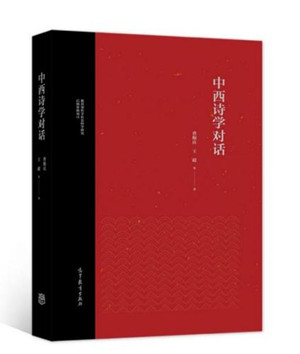
. > WHAT'S NEW > BOOKS
An equal dialogue between Chinese and Western poetics
Author : ZHAI LU Source : Chinese Social Sciences Today 2023-06-08

A Dialogue Between Chinese and Western Poetics
In the field of comparative poetics between China and the West, there has been a persistent issue of interpreting Chinese poems through the lens of Western standards, without fostering an equal, bilateral dialogue. A Dialogue Between Chinese and Western Poetics, by Cao Shunqing, a professor from the College of Literature and Journalism at Sichuan University, and Wang Chao, an associate professor from the School of Literature at Hainan Normal University, offers a Chinese perspective on the interpretation of ancient Chinese poetics and contemporary Western poetics through dialogue.
Comparative poetics was formally proposed by French scholar Rene Etiemble in the 1960s and emerged in China in the late 1970s. The book points out two basic viewpoints in Western comparative poetics: first, there is no knowledge system typical of Western poetics in Chinese poetics. Second, Chinese poetic discourse cannot have a cross-civilizational dialogue with Westerners. The authors argue that Chinese literary thoughts have influenced Western counterparts and have taken on a unique form in the development process of Western literary theory. For instance, they investigate the Chinese origin of the theories of Martin Heidegger, Michel Foucault, Jacques Derrida, and other Western scholars, especially their absorption and transformation of Chinese literary thoughts, and interpret Western contemporary literary theories with the concepts of ancient Chinese ones.
The variation theory underlines heterogeneity and variability. The authors delve into the variation of Western poetic thoughts as transmitted and accepted in China, and explore the heterogeneity of Chinese and Western poetics on the level of discursive representation as well as discourse modes behind this heterogeneity, with the ultimate goal of realizing bilateral dialogue and complementarity.
As contemporary Western and ancient Chinese literary theories have marked heterogeneous features, the authors uphold the principles of discourse independence, equal dialogue, two-way interpretation, and complementary heterogeneity on the basis of seeking common ground while reserving differences.
The differences of research objects can be compared as long as they fall within a common category or level. The authors conduct enlightening comparative studies, such as the mutual clarification between Northern Song (960–1127) writer Huang Tingjian’s “turning a piece of writing into a literary gem with slight changes” and “borrowing from previous poems and recreating without traces,” and the defamiliarization of Russian formalism. They make a comparison between Southern Dynasties (420–589) scholars Shen Yue and Zhong Rong’s “distinction between good and bad” regarding the word choice of literary creations, and the “tension” in British and American new criticism.
A contrasted interpretation is also given between the concept of “infinite implications beyond aesthetic images” in Chinese classical aesthetics, and the “spots of indeterminacy” in Western phenomenological criticism.
Zhai Lu is from the College of Literature and Journalism at Sichuan University.
Ye Shengtao made Chinese fairy tales from a wilderness
Ye Shengtao (1894–1988) created the first collection of fairy tales in the history of Chinese children’s literature...
-
How northern ethnicities integrated into Chinese nation
2023-09-18
-
Mogao caves
2023-09-12
-
Mogao Grottoes as ‘a place of pilgrimage’
2023-09-12
-
Time-honored architectural traditions in China
2023-08-29
-
Disentangling the civilizational evolution of China
2023-08-28
-
AI ethics in science fiction
2023-08-23













 2011-2013 by www.cssn.cn. All Rights Reserved
2011-2013 by www.cssn.cn. All Rights Reserved